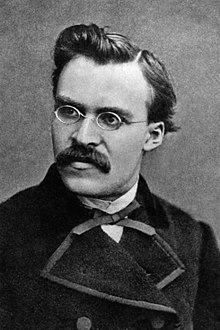Criticism of Jesus
Some psychiatrists, religious scholars and writers explain that Jesus' family, followers (John 7:20)[6] and contemporaries seriously regarded him as delusional, possessed by demons, or insane.More contemporary notable critics of Jesus include Ayn Rand, Hector Avalos, Sita Ram Goel, Christopher Hitchens, Bertrand Russell, and Dayananda Saraswati.(The religious leaders engaged in ceremonial cleansing like washing up to the elbow and baptizing the cups and plates before eating food in them—Mark 7:1–23,[14] Matthew 15:1–20.[25] A number of writers, including David Strauss,[7] Lemuel K. Washburn,[26] Oskar Panizza,[27][28][29] Lucian, and Friedrich Nietzsche,[30] have questioned Jesus' sanity by claiming he was insane for believing he was God and/or the messiah.[48] In certain major non-English translations,[attribution needed] the first statement in the first sermon of Jesus (Luke 4:18),[49] is a call to free the slaves: "The Spirit of the Lord is on me, because he has anointed me to proclaim good news to the poor.Nietzsche was repulsed by Jesus' elevation of the lowly: "Everything pitiful, everything suffering from itself, everything tormented by base feelings, the whole ghetto-world of the soul suddenly on top![citation needed] Noting that the Bible writes that women held the feet of Jesus and worshiped him, he questions: Was it the same body which had been buried?[citation needed]In the 1927 essay Why I Am Not a Christian, Bertrand Russell pointed to parts of the gospel where Jesus could be interpreted as saying that his second coming would occur in the lifetime of some of his listeners (Luke 9:27)."[56] Novelist and philosopher Ayn Rand denounced the altruist recipe that Jesus passed down to his pupils, and with it the idea of vicarious redemption.[57] Not surprisingly, her understanding of love as a consequence of the rational mind looking after embodied values considers the ideas Jesus is most famous for as immoral.[58]Notwithstanding disagreements over the value of faith and the existence of an afterlife, Rand saw Jesus' insistence on procuring the eternal happiness of individuals as confirmation of the moral confusion and inconsistency in which much of religious ethics operates, including Christian altruism.[63] Ram Goel also ridiculed what he termed "the cult of the disentangled Christ", whereby Christian revisionism attempts to salvage the figure of Jesus from the atrocious historical outcomes which he inspired—and only from the bad ones—as though missionary proselytism and Western expansionism were to be perceived in the separate as mere coincidences.It is believed by everybody that while [God] was in heaven he was stern, hard, resentful, jealous, and cruel; but that when he came down to earth and assumed the name Jesus Christ, he became the opposite of what he was before: that is to say, he became sweet, and gentle, merciful, forgiving, and all harshness disappeared from his nature and a deep and yearning love for his poor human children took its place.[64]Author and journalist Christopher Hitchens, one of the leading exponents in the "New Atheism" movement, was extremely critical of Jesus, Christianity and any religion in general.Regarding Jesus' teachings on hell, Hitchens wrote: The god of Moses would call for other tribes, including his favorite one, to suffer massacre and plague and even extirpation, but when the grave closed over his victims he was essentially finished with them unless he remembered to curse their succeeding progeny.Christ certainly as depicted in the Gospels did believe in everlasting punishment, and one does find repeatedly a vindictive fury against those people who would not listen to His preaching—an attitude which is not uncommon with preachers, but which does somewhat detract from superlative excellence.To Harris, Jesus' unresolved frustration and hatred of non-Christians runs contrary to the imagination of contemporary religious moderates, and actually lends honesty to more fundamentalist interpretations of salvation and hell."[74] In a review in Biblical Theology Bulletin, Sarah Rollens, a New Testament scholar at Rhodes College, remarks: "Hector Avalos aims not only to convince us that many portrayals of Jesus based on New Testament texts are morally or ethically problematic, but also to demonstrate how scholars have engaged in questionable distortions to minimize, explain away, or otherwise ignore any textual evidence that might not comport with modern ethical standards.304) authored the 15 volume treatise Against the Christians, proscribed by the Emperors Constantine and Theodosius II, of which only fragments now survive and were collected by Adolf von Harnack.Selected fragments were published in English translation by J. Stevenson in 1957, of which the following is one example: Even supposing some Greeks are so foolish as to think that the gods dwell in the statues, even that would be a much purer concept (of religion) than to admit that the Divine Power should descend into the womb of the Virgin Mary, that it became an embryo, and after birth was wrapped in rags, soiled with blood and bile, and even worse.And this one caused (nations) to destroy Israel by sword, and to scatter their remnant, and to humiliate them, and to exchange the Torah, and to make the majority of the world err to serve a divinity besides God.And all these things of Jesus the Nazarene, and of (Muhammad) the Ishmaelite who stood after him—there is no (purpose) but to straighten out the way for the King Messiah, and to restore all the world to serve God together.


Criticism of religionBaháˈí FaithBuddhismChristianityCatholicJehovah's WitnessesLatter Day Saint movementProtestantismSeventh-day AdventistUnification Church in JapanHinduismSwaminarayan sectIslamismTwelver Shia IslamJainismJudaismMonotheismNeopaganismScientologySikhismZoroastrianismEllen WhiteMuhammadHadithMormon sacred textsBook of MormonMormonismTerrorismChristianIslamicJewishPersecutionChristian thought on persecution and toleranceIn IslamIn JudaismSectarian violenceAnti-Christian violenceIn OdishaNigeriaPakistanApostasyIn ChristianityCriticism of atheismCriticism of monotheismSexualitySlaverySuperstitionsMuslimChrist CrucifiedDiego VelázquezMuseo del PradoMadridarrestedtried by the Sanhedrinsentenced by Pontius PilatescourgedRomansblasphemyseditionPhariseesscribesMosaic LawdecriedJewish messiah claimantidolatrypossessed by demonsinsanecritics of Jesus and ChristianityCelsusPorphyryFriedrich NietzscheAyn RandHector AvalosSita Ram GoelChristopher HitchensBertrand RussellDayananda SaraswatiRejection of JesusAbrogation of Old Covenant lawsChristian views on the Old CovenantMatthew 15publicansearly churchMosaic covenantPaul the ApostleNew CovenantPauline Christianitycanonical gospelsGospel of JohnMental health of JesusdelusionalBe-el′zebulRevised Standard VersiondemonsoccultDavid StraussLemuel K. WashburnOskar PanizzaLucianPsychologistspsychiatristsCharles Binet-SangléWładysław WitwickiWilliam SargantRaj PersaudAnthony Storrreligious delusionsAvery Robert DullesEvangelical QuarterlyKevin GilesThe AntichristHuman, All Too HumanTwilight of the IdolsDionysianArya SamajSatyarth PrakashWhy I Am Not a Christianhistorical existence of Jesusvicarious redemptionMike WallaceFor the New IntellectualHindutvaimperialismthe HolocaustAntisemitism and the New TestamentAdolf Hitler